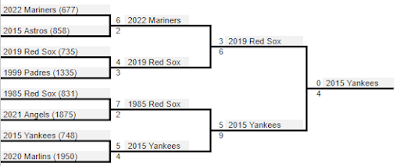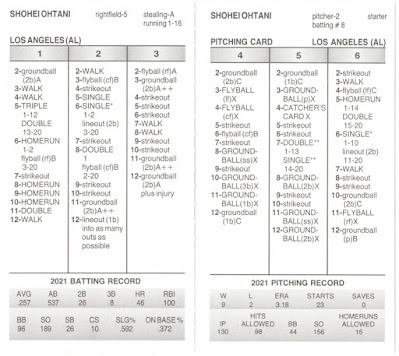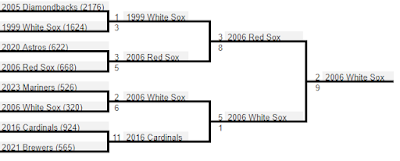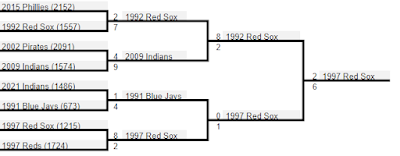REGIONAL #243: This draw had one of the final die-cut entries in the tournament, which was the Red Sox from the season before the infamous Bill Buckner World Series, meaning that they were likely to be a pretty good team. They also had company in the form of the 2019 version of the Red Sox as well as a Padres team that were both one year after a pennant, Other teams of interest included entries from the Yankees and Mariners who were probably both decent, and an Astros team that was starting to climb toward a series of pennants but were still a trash can away from dominance. Finally, there was a pandemic Marlins team that supposedly made the postseason and seemed to have a big stack of low usage cards, meaning that anything could be in there. Given the performance of the Red Sox over the past few teams, I thought about predicting another all-Boston finals, but opted to select the 2019 version of the Red Sox to win it all over the pandemic Marlins. The ELO ratings indicated that the Marlins were the worst team in a fairly strong bracket, and forecast that the Mariners would defeat the Yankees in the regional final.
First round action
The 2022 Mariners were bracket favorites, although after the 2023 version had been eliminated in the first round in the previous regional that didn’t lead to overconfidence. This edition won 90 games but was eliminated in the ALDS, with Julio Rodriguez winning Rookie of the Year and finishing 7th in the MVP ballots, and they boasted a deep rotation with Luis Castillo (8-6, 2.99) just one of many good options. The 2015 Astros were in the process of becoming perennial contenders, winning 86 games and also making the postseason to be eliminated in the ALCS; Dallas Keuchel (20-8, 2.48) won the Cy Young and finished 5th for MVP, while Jose Altuve and Carlos Correa also received votes. Both aces start the game off in control; in the top of the 5th the M’s piece together a two-out rally and load the bases for Rodriguez, but he’s retired on a deep fly to prevent any damage. They load them up again in the 6th, but Keuchel whiffs JP Crawford and again works out of the jam, and then he strands two in scoring position in the 7th to make it 8 men left on base in three innings for Seattle. But they break through in the 8th, snapping the scoreless tie with a two-run homer by Mitch Haniger and Keuchel heads to the showers, with Will Harris coming in to wrap up the inning. Meanwhile, Castillo is cruising until the bottom of the 9th, when after one out a pinch hit single is followed by a pinch hit homer by Hank Conger and suddenly the game is tied and the top of the Astros order is up. That spells the end for Castillo, and the literally unhittable Matt Boyd and his 1.35 ERA are summoned, and after two straight strikeouts the game heads for extra innings. Both teams go down in order in the 10th and 11th, which brings Harris to the end of his bracket eligibility and the greater bullpen depth of Seattle is beginning to look like a huge advantage. Luke Gregerson (HOU) and Erik Swanson (SEA) take over for the 12th and both do their jobs, but in the 13th Rodriguez converts a TR 1-5 split on Gregerson’s card to drive in a run and he scores when the infield comes in and Cal Raleigh hits the gbA++--but it’s also with an injury and the Mariners with be without their all-star catcher in the semifinals. Just to assure that they make the semifinals, Eugenio Suarez converts Gregerson’s HR 1-8 for a two run blast, and from there Swanson continues the hitless streak for Seattle in the extra frames, as the top seeded Mariners survive the 13-inning 6-2 win and head to the semis.
The 2019 Red Sox were the number #3 seed in the bracket, although their 84 wins were a bit disappointing after their championship in the prior season. Xander Bogaerts and Mookie Betts both finished in the top 10 for MVP while JD Martinez and Rafale Devers also received votes, and Eduardo Rodriguez (19-6, 3.81) was 6th for the Cy Young, They faced the 1999 Padres, who had also won a pennant in the prior year but had fallen further to a 74-88 record, with elder statesmen like Tony Gwynn and Wally Joyner on the downslope of their careers and Andy Ashby (14-10, 3.80) the best of a lackluster rotation. In the bottom of the 3rd, two walks set up an RBI double from Reggie Sanders to give SD the lead, although Rodriguez bears down and strands the remaining two runners in scoring position to keep it a one-run game. That lead quickly evaporates with a solo shot from Michael Chavis in the top of the 4th, and when a Bogaerts double followed by a Devers triple lead off the 6th, the Padres waste no time summoning star reliever Trevor Hoffman to try to stay in the game. He almost gets away with it, but a 2-out error from 3B-3 Phil Nevin and Devers scores to make it Boston 3, SD 1. A two out RBI single by Betts in the 9th provides some more padding, which is good because things start going south for Rodriguez in the 9th. An error by C-2 Christian Vazquez and a walk set up an RBI pinch hit single by Jim Leyritz, and a fielder’s choice by Joyner drives in another run to make it a one-run game with two away. The Red Sox stick with their ace for one more batter, but Quilvio Veras doubles off Rodriguez’s card and now the tying run is on 3rd and the winning run on 2nd in the form of fleet-footed Veras. That’s it for Rodriguez, and Brandon Workman comes in with no hits on his card to try to get that crucial last out against HOFer Gwynn. There may not be any hits on Workman’s card, but there are five walk results and Gwynn hits one of them to load the bases for Sanders. The roll is a 4-9, with 4-3, 4-5, 4-6, 4-7, and 4-8 all being walks, but 4-9 is a strikeout and Workman and the Red Sox survive the 4-3 win by the skin of their teeth.
Bill Buckner (1B-2) and the 1985 Red Sox were still a year away from an infamous World Series appearance, going only 81-81 although Wade Bogg’ league leading .368 average earned him 4th place for AL MVP; the rotation was bleak after Oil Can Boyd (15-13, 3.70) was drained. Nonetheless, they were substantial favorites over the 77-85 2021 Angels despite the presence of AL MVP Shohei Ohtani (9-2, 3.18), who hit 46 homers while also being the only pitcher on the staff with over 100 IP. But Mike Trout was limited to part time duty due to injuries and the rest of the team was forgettable, making the Angels pretty much a one-man show. In the top of the 3rd Marty Barrett misses Ohtani’s 6-5 HR 1-14 split, but with two out 1-14+2 Dwight Evans heads for home from first, and slides under the tag with a split roll of 16. In the 4th, an error by SS-3 Luis Rengifo sets up a 2-run triple from Tony Armas to push the Boston lead to 3-0, but in the bottom of the inning a 2-out error by 2B-3 Barrett allows Rengifo to atone with an RBI single , Phil Gosselin follows with another, and it’s a one-run game after four. In the 7th, Evans hits a long solo shot to provide a little insurance for a rather shaky Boyd, and Glenn Hoffman misses that 1-14 HR split on Ohtani but scores on a Barrett single; Boggs doubles and Buckner laces a 2-run single and Ohtani is struggling but the Angels won’t yank him as they don’t want to lose his bat. He regains his form and ends up completing the game with 11 strikeouts, but it’s to no avail as the Red Sox advance with the 7-2 win.
The #3 seeded 2015 Yankees won 87 games and made the postseason (briefly) as a wild card team, with 39-year old Alex Rodriguez getting some MVP votes after coming back from a year-long suspension, and Masahiro Tanaka (12-7, 3.51) was a decent round one starter. The 2020 Marlins went 31-29 in the pandemic season and also made the postseason as a wild card, getting to the NLDS before they were bumped, but their ELO rating was terrible, perhaps the worst I’ve seen for a postseason team and also the worst in this regional. Although the lineup was a bunch of unknowns, the mandated rotation turned out to be pretty good with Pablo Lopez (6-4, 3.61) at the top. But it’s a rough start for Lopez in the top of the 1st; the leadoff hitter, Brett Gardner, scores a solid double off Lopez’s card, and that’s followed by an error from P-1 Lopez. Then Carlos Beltran puts the Yanks on the board with an RBI single and Brian McCann follows with a 3-run homer and the Marlins are deep underwater before they even bat. However, Brian Anderson makes it a game with a two-run blast in the bottom of the inning, and back to back two-out doubles from Matt Joyce and Jon Berti tie the game in the 2nd. After his initial issues, Lopez begins to dominate the Yanks, while Tanaka is pitching from the stretch a lot but manages to avoid damage. However, a leadoff single in the bottom of the 7th and New York has seen enough, with the nearly unhittable Dellin Betances and his 1.50 ERA coming in and striking out the side. Two hits for the Yankees in the 9th and the Marlins respond with their own relief wonder, Yimi Garcia and his 0.60 ERA, but an error from SS-2 Miguel Lopez loads the bases. In comes the infield, and that works as Anderson is a forceout at the plate trying to score on a grounder, and Garcia preserves the tie. Betances survives a 2-base error from 3B-3 Chase Headley in the bottom of the 9th, and the game heads to extra innings. ARod immediately changes the game with a leadoff homer to begin the 10th, and then hoping to preserve some eligibility for Betances the Yanks bring in closer Andrew Miller to try to secure the final three outs. He does issue a walk but Starling Marte hits into the DP to end the game, and the Yankees scrape by with a 5-4 win to advance.
The survivors
The top two seeds of the bracket face off in this semifinal with the favored 2022 Mariners and George Kirby (8-5, 3.39) against the 2019 Red Sox and a longball-prone Chris Sale (6-11, 4.40), although Seattle’s apparent starter advantage was offset by an injury to star catcher Cal Raleigh and a bullpen worn thin by a 13 inning game in round one. The Mariners take the early lead when Julio Rodriguez raps a 2-out RBI single in the top of the 3rd, and for six innings Kirby is in total control However, when the Red Sox lead off the bottom of the 7th with two straight singles, the deep Seattle pen gets the call in the form of Andres Munoz, and he sets down three straight as the Mariners cling to the one run lead after seven. A leadoff single by injury replacement Curt Casili to lead off the 8th and Brandon Workman gets more work out of the pen and holds off the M’s, while in the bottom of the inning two walks set up a 2-out RBI single from Mookie Betts that ties the game heading into the 9th. Workman strikes out the side in the top of the 9th to end his regional eligibility, and Munoz also strikes out the side in the bottom of the inning to send the game into extra frames. Boston summons Marcus Walden to begin the 10th, and he gets through the 10th without incident, as does Munoz in his last inning of eligibility for Seattle. However, in the 11th a walk and a Rodriguez double and there are two runs in scoring position with nobody out for Seattle, so Boston opts for strikeout specialist Matt Barnes and brings the infield in. And it pays off, as Barnes strikes out two straight and CF-1 Jackie Bradley hauls in the final out, but when game 1 winner Erik Swanson is called in for Seattle he sets down Boston in order and the game heads to the 12th. Barnes is perfect in the top of the 12th, while Swanson issues a single and two walks to load the bases in the bottom of the inning with one away, but Swansn whiffs Andrew Benintendi and Bradley flies out and the game heads to the 13th. In the top of the 13th, a walk and a Rodriguez single is followed by another walk to load the bases; Barnes strikes out two in a row but DH Jesse Winker rips a 2-out single that drives in two. So Seattle heads to the bottom of the inning with a 2-run lead but Swanson is toast and Penn Murfee is responsible for preserving the game against the top of the Boston order. But a leadoff single and a walk set up an RBI single by Xander Bogaerts and the tying run is at 3rd with one away. In comes the infield for backup 2B Marco Hernandez, who knocks a hard single to tie the game and put the now winning run on 3rd. But Christian Vazquez pops out and Mitch Moreland whiffs and the game heads to the 14th. Barnes survives an error from 3B-4 Brock Holt by striking out the last two Seattle batters in the top of the inning, while Murfee survives the bottom and things head to the 15th and the 5th Boston pitcher, Josh Taylor, who does his job, as does Murfree until he has to be lifted in the bottom of the 17th for Paul Sewald. With two out in that inning, JD Martinez misses a HR 1-5 split for a double, then Bogaerts singles and 1-11+2 Martinez sets sail for home–a 16 split, and the game heads to the 18th. A single and two walks in the top of the 18th load the bases for Seattle with one out, but 3B-4 Holt makes a miracle stop and Taylor whiffs Eugenio Suarez as his final batter to be faced. In the bottom of the inning, a walk and an error by 3B-2 Suarez brings up Benintendi, who locates Sewald’s HR 1-9/flyB split; he converts the split and the Red Sox get a walkoff three-run homer in the 18th inning for a 6-3 win and yet another trip to the finals for a Red Sox squad.The other semifinal matched the #3 and #4 seeds in the bracket, the 2015 Yankees and Adam Warren (7-7, 3.29) against the 1985 Red Sox, who had Al Nipper (9-12, 4.06) trying to make it an all-Boston final. That effort gets an assist in the top of the 1st with a two-out RBI single by Rich Gedman, but Nipper issues four walks in the bottom of the 3rd, and when that is combined with two hits and a 2-out error by none other than Bill Buckner, the score is 5-1 New York after three. When Brett Gardner leads off the bottom of the 4th with a homer off Nipper’s card, Boston tries young Roger Clemens out of the pen, as he didn’t have enough innings to start, and he retires the side without further damage. Boston narrows the gap slightly with a Tony Armas RBI single in the top of the 6th, and Armas drives in another with a triple in the 8th and he scores on a Dwight Evans single and things are getting a little more interesting. The Yankees don’t want interesting, and they bring in Andrew Miller in search of his second straight save and he gets out of the inning without incident, but it’s now a two-run game. Meanwhile, Clemens is burnt after four hitless innings so Bob Stanley gets the call, but Stanley yields a squib single, a walk, and then a three-run homer to the #9 hitter Jacob Ellsbury and the Yanks reassert dominance. Seeking to preserve Miller’s last inning of eligibility, New York tries Braden Pinder for the 9th, which has the potential to go horribly wrong; Pinder gets two quick outs but then surrenders back to back doubles to Gedman and Armas but then 3B-3 Chase Headley makes a highlight play on a grounder for the final out and the Yanks head to the finals, working 9-5 for the win despite getting outhit 12-6.








